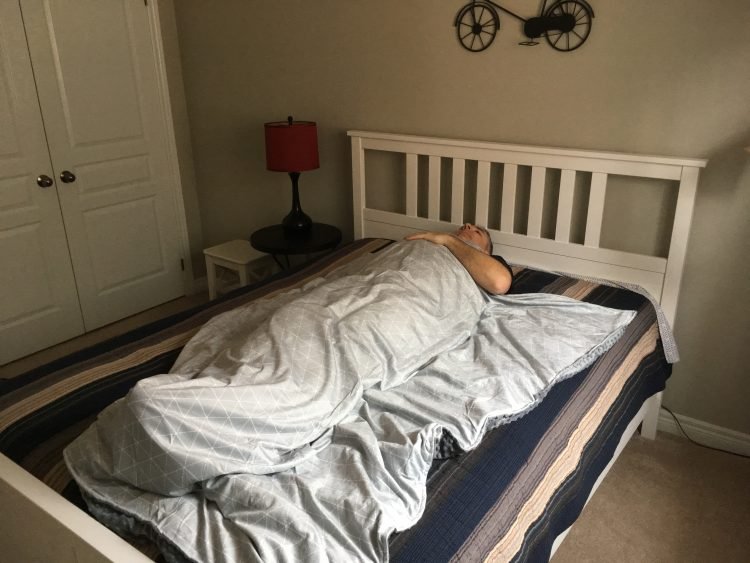If you find yourself having trouble relaxing after work or you find your mind racing while you are trying to sleep, anxiety may be getting the best of you.
For years occupational therapists have been using weighted vests or blankets to calm patients with more serious mental health issues such as PTSD, autism, or anxiety disorders.
Now that weighted blankets have become something anyone can order online, you may want to consider one to help with your day to day anxiety.
Before discussing what helps with anxiety, it is probably useful to know exactly what anxiety is.
Anxiety is physiologically similar to fear, but there is an important difference.
Fear is an appropriate response to danger and helps us avoid harm. For example, a threatening dog will probably scare you and that fear will keep you keep safe.
When your body releases adrenaline due to your brain perceiving a threat, your heart rate and breathing will speed up so you can run away.
Your muscles will tighten and become tense so you can fight.
Your senses will become more acute while your brain pays more attention to negative input, so you can come up with a better strategy than either wrestling the dog or trying to outrun it.
This is called the fight-or-flight response and it helps us to react to an angry co-worker or even survive a mugging.
Fear can be a good thing. But what about anxiety? If fear is your body’s reaction to a threat, anxiety is the same reaction, directed at a danger that may occur.

Anxiety is when you walk into work full of adrenaline because a co-worker might confront you.
It’s lying awake at night worrying that the rustling outside could be an intruder. Anxiety makes us ask “what if” this happens, or “what if” that happens.
It can even leave us asking “What if….” with no specific worry, just a general feeling of impending disaster.
Sometimes anxiety isn’t concern about a future threat so much as a lingering fear after a genuine threat has passed.
What all anxiety has in common is that the body is responding to a threat that isn’t present, so it isn’t useful.
Anxiety can, in fact, be harmful.
Hormones like cortisol, the stress hormone, help rev up your body for fight-or-flight, but they aren’t meant to be constantly in your system.
A fast pulse, rapid breathing, tightened muscles, these are good in a crisis, but no way to live your life.
After the threat, we need to calm back down. This is where weighted blankets come in.
They help your nervous system move to the state opposite fight-or-flight, sometimes called rest-and-digest.
Weighted Blankets Help You Rest and Digest
One part of your nervous system, the autonomous nervous system, works autonomously, as the name implies.
This means it works on its own, without any conscious thought from you. Your heart beats, you breathe in and out, and the muscles in your intestines constrict and relax.
All in rhythm, and all without you thinking about it.
The sympathetic part of the system is responsible for increasing your heart rate and slowing digestion, while the parasympathetic part calms your heart and increases digestion, among other things.
A study of dental patients having wisdom teeth extracted, with and without the use of weighted blankets, showed that weighted blankets help “…enhancement of parasympathetic activation”.
In other words, they nudge us from a state of anxiousness, fight-or-flight, and into a state of relaxation, rest-and-digest.
The Hug Affect
“I need a hug!” How many times have you heard that from a loved one, or said it yourself?
When your little one has a nightmare and comes to you anxious and upset, what do you do? You hold him or let him cuddle in your bed, in effect, you hug him.
As kids, our parents can completely wrap us up in their arms, giving us a feeling of all-over body security.
But eventually, we are literally too big for that. No other adult can wrap us up in their embrace. But a weighted blanket can.
It can apply the same kind of pressure, called deep touch pressure, those hugs give us, and a weighted blanket can apply that deep pressure to all your body at once, just like when you were a kid.

When you come home worrying about how you messed up at work, and are pretty sure you are going to be fired, never employed again, and probably starve on the streets, what do you ask for from your spouse?
A hug. But what if you don’t have anyone to come home to?
Or maybe you you did have someone to ask for a hug, but you were so grumpy after work, your significant other just isn’t feeling it yet?
A weighted blanket is available even if you are single, or alone, or acted so badly you don’t want to ask for a hug.
It can’t give you love, but it can give you a chance to feel better, by calming and grounding your body.
Grounding You
Many experts in anxiety or just general self-care recommend grounding.
Grounding is the effort to focus on something physical, something that hopefully appeals to your senses, as a way to stop the cycle of worry and agitation.
Weighted blankets can help ground you and this helps calm your anxiety.
Grounding brings your mind into the hear and now.
As you watch a raindrop move slowly down a window, you are focusing on what your eyes are seeing, and what your brain is perceiving, as it happens.
When you pay attention to the smell of the spices in a cup of chai tea, you are experiencing the smell in the moment.
Anxiety focuses on what will happen in the future or replays what happened in the past, so grounding helps you move to the present and disrupts the anxious cycle.
Your brain can’t really do two things at once.
What we think of as multi-tasking is just our brains switching back and forth very rapidly.
Those thoughts flying around quickly as you try to think of multiple things you need to do, even if they aren’t upsetting, keeps you in an agitated state.
Anything that stimulates your senses in a positive way helps to ground you.

How do weighted blankets help ground you? First, the weight aids proprioception. Proprioception is your brain being aware of where your body is.
Deep pressure stimulates that awareness and encourages continued attention to sensory details. Further, the blanket itself provides sensory input.
The weight is one kind of touch, the texture of the fabric is another, and the visual appeal of the pattern is a third possible sensory detail to attend to.
Paying attention to your senses breaks the anxiousness and grounds you in pleasant details. Real and immediate details, not hypothetical problems.
Like Having A Massage
Getting a massage is such a common way to curb anxiety and stress that it’s almost a cliché.
Weighted blankets calm your nervous system through the same deep touch pressure that a massage would.
But weighted blankets offer a better value over time.
As an example, if you slept with the weighted blanket, or used it nightly to destress before bed, instead of going in for a weekly massage, the blanket would pay for itself within a month.
Also consider that one weighted blanket can be used by several family members, if not at the same time, then on the same day or even alternately throughout the week, without any additional cost.
In contrast, two massages for two people costs twice as much as a massage for one.

If you have painful muscle tension or another medical issue that massage addresses, then of course, a weighted blanket won’t offer the same relief.
But for soothing day to day anxiety, it might be a viable alternative.
You don’t have to make an appointment or worry about “getting in” for an appointment when you want a massage from your weighted blanket.
Weighted Blankets Are an Alternative to Medicine
If you suffer from a serious anxiety disorder, a weighted blanket might help you, but it shouldn’t take the place of medical treatments, therapy, or drugs.
On the other hand, if you are on the border, suffering from more anxiety than is healthy, yet not suffering from a diagnosed illness, a weighted blanket might be just the thing.
And if you do have a serious condition, a weighted blanket as therapy could minimize the amount of medicine you need to take.
Of course, discuss this with your doctor or psychologist before making any changes.
The majority of drugs targeted at anxiety and depression focus on two “feel good” hormones, serotonin and dopamine.
These hormones are known to be released during deep touch pressure such as massage and thought to be released with the use of a weighted blanket as well.
Along with an increase in the good hormones, the stress hormone cortisol was decreased.
More studies of weighted blankets are needed to prove conclusively, but the general consensus is that weighted blankets do provide more of these important chemicals that are prescribed to improve mood.
Weighted blankets in contrast to medicine, can be used therapeutically when needed, at your own discretion, and under your own control, in contrast to anti-depressants which must be taken daily to help with even occasional anxiety.
Other as-needed anti-anxiety drugs offer temporary relief from anxiety, but most cause drowsiness and many are addictive.
Helping Stop the Fidgets
One problem with anxiety is that it becomes a vicious circle. Your mental state causes a physical reaction, which causes a more agitated mental state and more physical restlessness.
If you are feeling anxious, you might find it difficult to sit still while you try to relax or you might find yourself tossing and turning in bed, both of which only make the agitation worse.
Weighted blankets interrupt the physical part of the cycle by not forcing, but strongly encouraging you to be still.

You can move with a weighted blanket over you, but it is more difficult.
It won’t make you feel tied down or stop you from changing positions if you are uncomfortable, but it might help you stop wiggling about.
As your body movement becomes calmer, your brain picks up the message, and your body further relaxes, aiding in moving to a state of relaxation or sleep.
In fact, being still sends a message to the brain that you are not anxious, and it reacts accordingly.
Encouraging Sleep
From birth, we associate pressure with sleep. We are swaddled in blankets and held tight by our parents from the day we are born.
And really, the womb isn’t the roomiest of environments, so even before birth, our bodies are familiar with the feeling of outside pressure compressing us into a small, cozy space to sleep in.
Since babies sleep most of the time, it makes sense that conditions we associated with sleep as infants, remains comforting and sleep-inducing as adults.
This is true of some of us more than others. If you are one of those people who pile on the heaviest blankets you can find, you know who you are.
For some of us, heavy blankets are a lifelong preference, and if you are one of those people, weighted blankets may be the thing you never knew you always wanted.
Our minds also associate blankets with sleep. Why do we sleep with some kind of blanket all year round, even when we aren’t cold?
Why do we feel more secure sleeping with a light blanket or sheet, even in the heat of the summer?
We cover up with a blanket to go to sleep because blankets are connected to sleep in our minds. Weighted blankets just intensify and reinforce that mental connection.
Offering Pressure Without the Heat
Most weighted blankets are cuddly and warm, which is great during the winter months. But if you don’t need or want the heat, they do offer cooler alternatives.
Piling on heavy blankets only gives you one choice – hot. What are some options?

While weighted blankets often come in a plush cover fabric, many are offered with a cotton cover, which will be cooler to the touch.
Think about it, you take the flannel sheets off your bed in the summer and replace them with cotton, and the same choice is available with weighted blankets.
Some companies even sell covers specifically designed to keep you cool.
Stretchy, highly fitted sheets, work on the same principle of providing deep pressure stimulation but are not technically a weighted blanket.
They are made of highly stretchy fabric and fit on your bed like a whole-mattress pillowcase. The fabric stretches over your body and holds it in tight.
These are especially good for children.
What Should You Look for in a Weighted Blanket?
This depends on your personal circumstances, but some options are size, fabric type, fabric pattern and color, and weight.
If you want a cooler blanket, look for a cotton cover which feels cooler to the touch.
Most are machine washable, both the cover and the inner blanket, but check the specifics before you buy and certainly before you throw it in the wash.
A washable cover will save wear and tear on the blanket inside, and it will need to be washed less often.
As for size, keep in mind that weighted blankets are meant to cover your body, enveloping you in its weight and texture.
They are not meant as a bed cover, but a people-cover.
In addition, if two people are sleeping under it, the side next to your sleeping partner, will not have the same amount of weight on it because the blanket will be suspended between you two.
There are blankets for kids, and there are lap blankets. Think of who will be using it, where and how, before you order.
You may want to consider if it will be sitting out, whether the blanket matches the décor of the room it will be in.

As for weight, although manufacturers and experts vary on their recommendations, somewhere between seven and fifteen percent of your body weight is the norm.
If you weigh 150 pounds, fifteen pounds would be 10 percent of your weight.
Of course, consider finding a good average between weights if more than one person will be using it.
If there is a huge disparity in the size of your family members, more than one blanket may be advisable.
Conclusion
We all suffer from day to day stress, and sometimes, those little anxious moments become a pattern of anxiety.
When anxiety is beginning to affect your quality of life, distracting you from enjoying time with your friends and family, or making sleep difficult, you may want to consider a weighted blanket as a safe, non-medical, cozy, cuddly way to bring down your anxiety.

